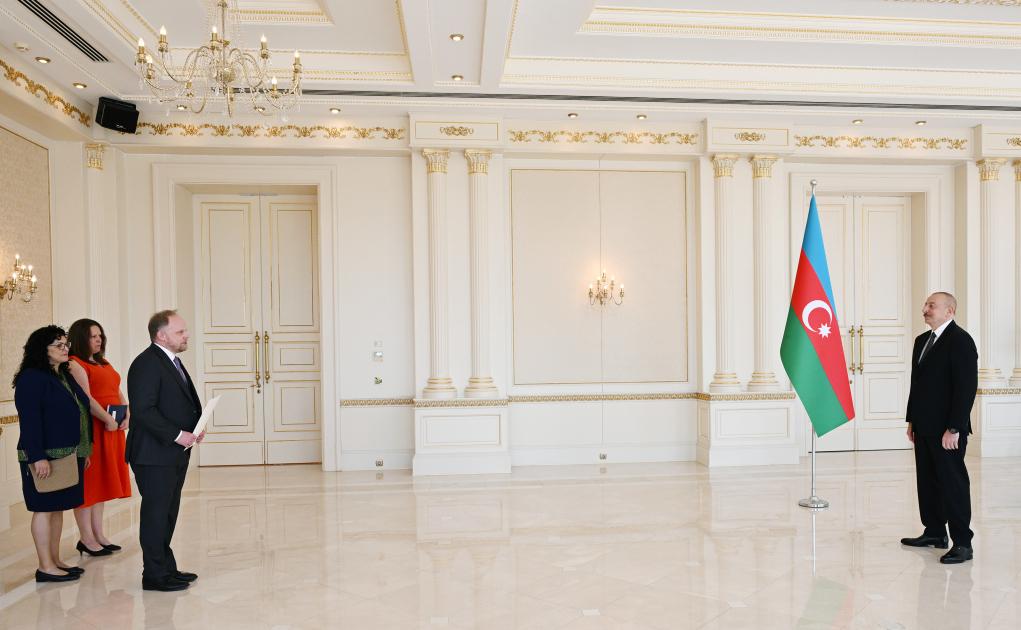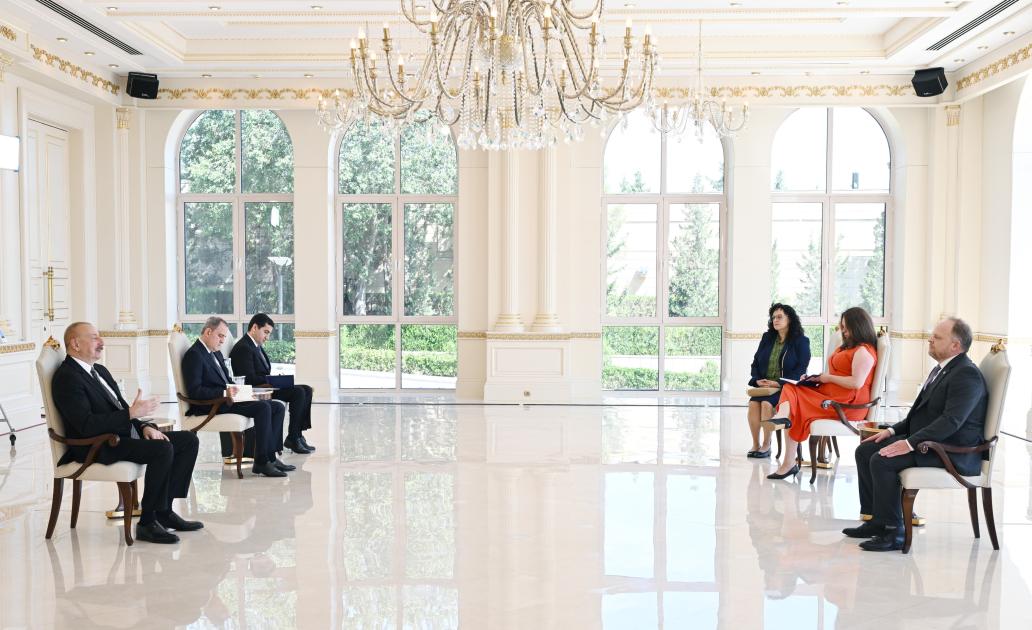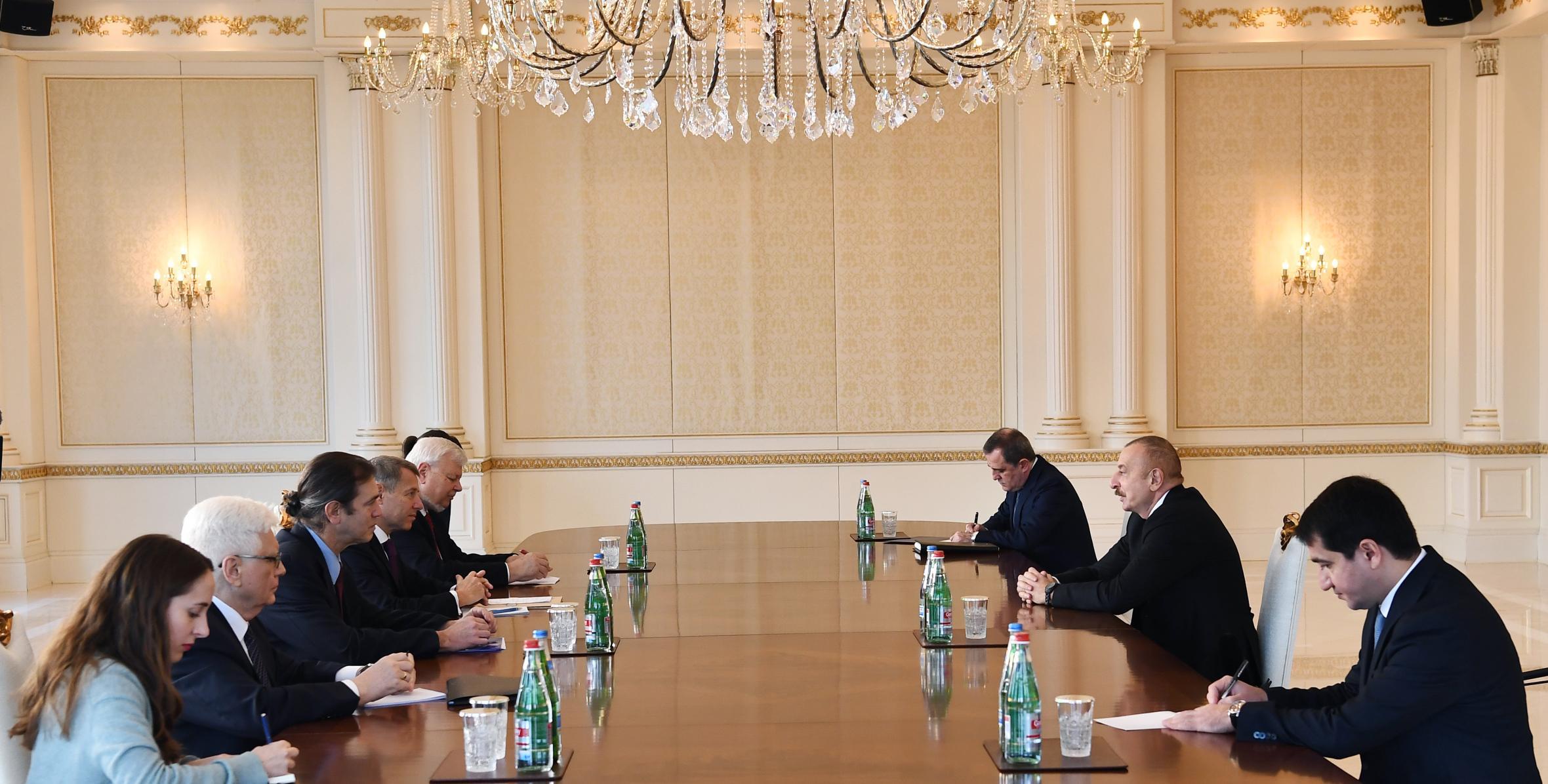New Canadian envoy’s hastiness versus President Aliyev's acumen
The interest behind envoy's one-sided question?
ANALYTICS 02 July 2024 - 18:22
| Fuad Muxtar-Agbabali |
On July 1, 2024, President Ilham Aliyev of Azerbaijan received the credentials of newly-appointed Canadian Ambassador Kevin Hamilton. The meeting marked a significant moment in the diplomatic relations between Azerbaijan and Canada, focusing on the prospects of a peace treaty between Azerbaijan and Armenia. The conversation between President Aliyev and Ambassador Hamilton revealed deep insights into the historical context, current dynamics, and future aspirations for peace and cooperation in the South Caucasus region.
Canada's position on the Karabakh issue
Canada's position on the Armenian-Azerbaijani conflict has been multifaceted and sensitive, often perceived as aligning more closely with Armenia's perspective, failing a balance between international diplomatic considerations and domestic political factors.
Although Canada openly advocated for peace and dialogue, emphasizing the importance of human rights and the rule of law, the interplay of historical ties, diaspora influences, and geopolitical interests has made it challenging for Canada to maintain an entirely neutral stance in the prolonged and intricate conflict.

Canada has demonstrated a commitment to Armenian security by participating in the EU's monitoring mission in Armenia. This mission allegedly aims to enhance human security and improve Armenian-Azerbaijani relations by monitoring conditions along Armenia's side of the border with Azerbaijan. Canadian observers are part of this mission to help mitigate potential military escalations which so far have not been registered.
Ottawa imposed an embargo on military exports to Turkey in 2021, following evidence that Turkish forces had used Canadian-made technology in drones during the 2020 Nagorno-Karabakh war. This action indicated Canada's disapproval of the use of its technology in the conflict.
Lastly, Canada's diplomatic activities are influenced by its domestic Armenian diaspora, which has been vocal about issues related to the Karabakh conflict. Canadian officials, including Foreign Minister Mélanie Joly, have engaged with diaspora groups and emphasized Canada's role in addressing concerns about Armenians in the region.
On the other hand, Ambassador Hamilton's remarks at the meeting highlighted Canada's stance on the conflict, who said Canada has consistently supported Azerbaijan's sovereignty and territorial integrity, aligning with international norms and principles.
Hamilton expressed optimism that a comprehensive peace treaty between Azerbaijan and Armenia would open new avenues for regional cooperation. He emphasized Canada's desire to foster better relations in the South Caucasus, contributing to stability and development.
Mutual right of return: A new dimension in the Armenian-Azerbaijani conflict
A significant and unprecedented event unfolded on July 1 during a public hearing at the meeting between the Azerbaijani president and the Canadian ambassador in Baku. When the ambassador inquired about the possibility of Karabakh Armenians returning to the region, President Ilham Aliyev's response highlighted a critical aspect of the broader conflict. He asserted that any right of return must be reciprocal, emphasizing that Azerbaijanis should also be allowed to return to their homes in Zangazur, where they lived until 1988.
In his direct response, President Aliyev stated, "The right of return should be mutually ensured, including for the representatives of the Western Azerbaijan Community." He further elaborated that during various periods of the last century, particularly in 1988, the indigenous Azerbaijani population was subjected to ethnic cleansing from what is now Armenia. He pointed out that their material and cultural heritage was entirely obliterated.
This exchange underscores the deeply rooted historical grievances that continue to shape the Armenian-Azerbaijani conflict. President Aliyev’s remarks bring to light the Azerbaijani perspective on displacement and ethnic cleansing, challenging the international community to consider the full scope of historical injustices. This insistence on reciprocity in the right of return adds a layer of complexity to the peace process, as it calls for acknowledgment and redress of historical wrongs faced by both communities.

From a diplomatic standpoint, this dialogue indicates a potential shift in Azerbaijan's approach, emphasizing the need for balanced restitution and mutual recognition of past sufferings. For Canada, which has often navigated this conflict with a sensitive and multifaceted stance, this development presents both a challenge and an opportunity to reassess its diplomatic strategies and advocacy for human rights and reconciliation in the region.
During the conversation with Ambassador Hamilton, President Aliyev provided a detailed account of the current state of negotiations and the challenges ahead. He underscored that despite the absence of a formal peace treaty, significant progress has been made in border delimitation and bilateral discussions. Aliyev pointed out that for the first time, the process is free from external interference, allowing Azerbaijan and Armenia to engage directly.
Aliyev also highlighted the significance of the Conference of the Parties (COP29) to the UN Framework Convention on Climate Change, where Armenia lifted its veto on Azerbaijan's participation. This move, according to Aliyev, symbolizes a positive shift in Armenia's approach and indicates potential for further cooperation.
However, the president remained cautious about the broader implications of a peace treaty. He argued that while a treaty is important, it is not a prerequisite for Azerbaijan's diplomatic activities or its strategic partnerships, particularly with the EU. Aliyev emphasized that Azerbaijan has diversified its diplomatic engagements, establishing strategic partnerships even during the occupation period, demonstrating that regional stability does not hinge solely on a peace agreement with Armenia.
The path to a comprehensive peace agreement is fraught with challenges. One of the critical obstacles, as highlighted by President Aliyev, is Armenia's constitution, which contains territorial claims against Azerbaijan. Aliyev insisted that amending this constitution is a prerequisite for any peace agreement. He also noted the complexities of resolving issues that have festered for nearly three decades, emphasizing the need for patience and sustained effort.
Despite these challenges, President Aliyev expressed optimism about the ongoing negotiations. He believes that the core principles of a peace agreement could be finalized within months, using frameworks like the Madrid Principles as a foundation. The president suggested a phased approach, starting with an agreement on basic principles followed by detailed text drafting.
Historical context and background
The conflict between Armenia and Azerbaijan over Nagorno-Karabakh and surrounding territories has roots stretching back to the early XX century, but it escalated dramatically in the late 1980s and early 1990s as the Soviet Union disintegrated. In 1991, Nagorno-Karabakh, an ethnically Armenian enclave within Azerbaijan, declared independence, leading to a brutal war. By the ceasefire in 1994, Armenian forces had occupied not only Nagorno-Karabakh but also seven adjacent districts of Azerbaijan, resulting in significant displacement and humanitarian crises. Despite the ceasefire, the situation remained volatile and unresolved until 2020.
The OSCE Minsk Group and its failures
The Organization for Security and Co-operation in Europe (OSCE) Minsk Group was established in 1992 to mediate the conflict. Co-chaired by Russia, France, and the United States, the group aimed to facilitate a peaceful resolution through negotiations. However, the Minsk Group faced numerous challenges, including divergent interests among the co-chairs and the intransigence of the conflicting parties. Over the years, various proposals and peace plans were presented, but none succeeded in breaking the deadlock.

President Ilham Aliyev, during his conversation with Ambassador Hamilton, highlighted the failure of the Minsk Group to achieve a lasting resolution. He pointed out that despite numerous meetings and initiatives, the Armenian side consistently resisted compromise, aiming to perpetuate the occupation of Azerbaijani lands. Aliyev's critique extended to the permanent members of the UN Security Council, who he argued did not exert sufficient pressure on Armenia to withdraw from occupied territories, effectively enabling the status quo to persist.
Azerbaijan's military liberation of occupied territories
The impasse persisted until September 2020, when Azerbaijan launched a military offensive to reclaim its occupied territories. The 44-day war, often referred to as the Second Karabakh War, resulted in significant territorial gains for Azerbaijan. By the war's end in November 2020, Azerbaijan had liberated large swathes of land, including key strategic locations in Nagorno-Karabakh. A Russia-brokered ceasefire agreement facilitated the deployment of Russian peacekeepers to the region and mandated the return of additional territories to Azerbaijani control.
President Aliyev's narrative underscores the importance of this military campaign in altering the regional dynamics. The successful reclamation of occupied lands not only restored Azerbaijan's territorial integrity but also shifted the power balance, compelling Armenia to engage in substantive negotiations. Aliyev emphasized that Azerbaijan's determination and military strategy were crucial in achieving these outcomes, thereby reinforcing the principle that international law and territorial sovereignty must be upheld.
Conclusion
The meeting between President Ilham Aliyev and Ambassador Kevin Hamilton signifies a crucial moment in the evolving diplomatic landscape of the South Caucasus. Canada's support for Azerbaijan's sovereignty and its proactive engagement in promoting peace underscore the potential for positive change in the region. The conversation between the leaders highlighted the complexities and challenges of the peace process, while also reflecting a cautious optimism about the future.
Azerbaijan's military successes, coupled with its strategic diplomatic efforts, have created a new dynamic that compels Armenia to engage in meaningful negotiations. The path to a comprehensive peace agreement remains complex but with sustained effort, international support, and a commitment to justice and reconciliation, lasting peace and stability in the South Caucasus are achievable. Canada's role in this process, as a supporter of international norms and a promoter of regional cooperation, will be instrumental in shaping the future of this historically troubled region.
Caliber.Az
|
1
|
New Canadian envoy’s hastiness versus President Aliyev's acumen The interest behind envoy's one-sided question?
02 July 2024 - 18:22
|
|
2
|
Iran's pivotal presidential runoff: Pezeshkian vs. Jalili A new political era after Raisi’s death?
01 July 2024 - 18:00
|
|
3
|
Yerevan stalls Zangezur corridor: A "Peace Crossroads" to nowhere Hindering regional connectivity
02 July 2024 - 15:09
|
|
4
|
South Caucasus looking forward to new EU top officials’ activity Activity towards Azerbaijan to depend on some factors
01 July 2024 - 13:04
|
|
5
|
Russia destroys five Su-27 fighters at Ukraine's Myrhorod airfield VIDEO
02 July 2024 - 15:09
|
Iraq secures Turkmen gas via Iran swap deal
04 July 2024 - 20:46
Erdogan calls for global peace efforts amid Gaza crisis
04 July 2024 - 20:35
Russia prepared to produce short- and medium-range missiles - Putin
04 July 2024 - 20:16
Azerbaijan and UN discuss future cooperation at high-level meeting
04 July 2024 - 20:00
Campaigning concludes for Iran's 2024 presidential runoff
04 July 2024 - 19:44
Belarus backs China's peace initiative for Ukraine conflict, Lukashenko tells Xi Jinping
04 July 2024 - 19:27
Putin confident in strengthening Moscow-Tehran relations despite Iran's elections
04 July 2024 - 19:11
Finland to implement stricter entry rules from September 1
04 July 2024 - 18:55
Azerbaijani leader concludes Kazakhstan visit
04 July 2024 - 18:47
Erdogan urges heightened international pressure on Israel
04 July 2024 - 18:40
Media: Pakistan prepares $2-3 billion investment portfolio for Azerbaijan
04 July 2024 - 18:25
Kazakh leader: SCO member states highly appreciate Azerbaijan's contribution
04 July 2024 - 18:10
Armenian former official slams incompetent government
04 July 2024 - 17:58
Israel faces Hezbollah's most intense attack since conflict's onset
04 July 2024 - 17:46
President Aliyev: Azerbaijan plays key role in North-South transport corridor development
Address at "SCO Plus" meeting in Astana04 July 2024 - 17:36
Georgia seeks to mend relations with US
04 July 2024 - 17:34
Ukrainian president rejects ceasefire proposal from Hungarian PM
04 July 2024 - 17:22
Q&A: Iran's runoff presidential elections amid historic low turnout
Reformists vs. hardliners04 July 2024 - 17:15
Putin discusses Qatar's potential entry into North-South transport corridor
04 July 2024 - 17:11
Azerbaijani troops engage in tactical exercises to boost readiness
PHOTO04 July 2024 - 16:58
China's economic leverage could end Ukraine war
Amid Russia's isolation04 July 2024 - 16:46
Experts debate Zangezur corridor's viability amid Armenia's futile "Crossroads of Peace"
Armenia's populism stifles regional development04 July 2024 - 16:34
German FM: Russia to remain Europe's biggest threat
04 July 2024 - 16:22
Ukraine’s Zelenskyy declines interview with US journalist Tucker Carlson
04 July 2024 - 16:10
UN Secretary-General António Guterres outlines expectations for COP29 in Baku
04 July 2024 - 15:58
French leader's allies urge him to stay off campaign trail
04 July 2024 - 15:46
Turkish army neutralizes over 1,300 terrorists in 2024 operations so far – Spokesperson
VIDEO04 July 2024 - 15:34
Azerbaijani MFA congratulates US on Independence Day
04 July 2024 - 15:22
Majority of Azerbaijanis advocate peace with Armenia
Poll findings04 July 2024 - 15:10
Kyrgyz leader to visit Azerbaijan for Turkic states summit
04 July 2024 - 14:57
China assumes SCO chairmanship
04 July 2024 - 14:41
Türkiye’s Kars hosts forum on "Return to Western Azerbaijan”
Calls for unified homeland return04 July 2024 - 14:26
France's interior minister to step down following snap parliamentary elections
04 July 2024 - 14:11
NATO concern grows over potential French far-right government entry
04 July 2024 - 14:02
Putin: Russia's proposal aims to achieve immediate cessation of hostilities
04 July 2024 - 13:51
Armenian PM sends security chief on official mission to UK
04 July 2024 - 13:39
Astana summit marks a pivotal moment for Azerbaijan-China strategic partnership
Why Asia matters?04 July 2024 - 13:27
Turkish Forces destroy over 30 terrorist locations in northern Iraq
MAP04 July 2024 - 13:15
Azerbaijani, Uzbek central banks ink Memorandum of Understanding
PHOTO04 July 2024 - 13:03
Azerbaijani President to attend "SCO plus" format meeting in Kazakhstan
PHOTO04 July 2024 - 12:55
